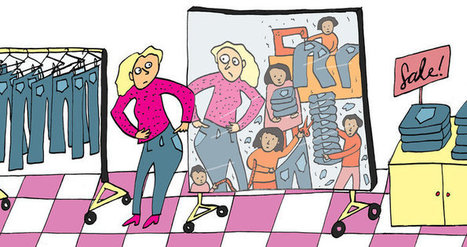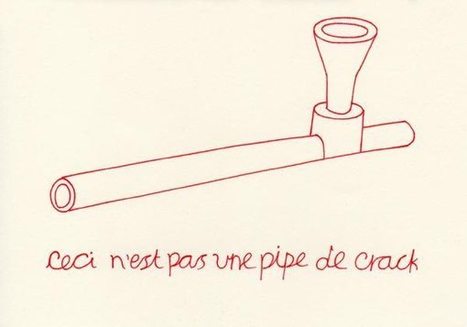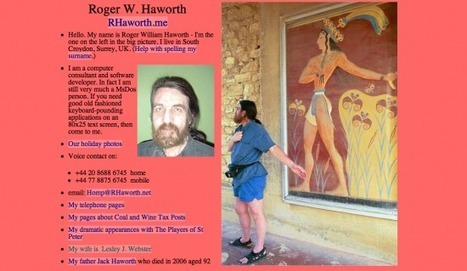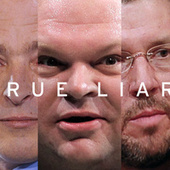 Your new post is loading...
 Your new post is loading...
The study, which will be published in the July edition of the Journal of Consumer Psychology but is already available online, builds on earlier research suggesting that most shoppers experience a kind of ethical dissonance: If we're actually told that a specific product was produced in an unethical way, we won't want to buy it. Yet given the choice, most of us would rather not know the backstory. We won't make the effort to, say, download an app or check out a website that could give us ethical ratings of manufacturers. And the reason we avoid this extra checking-up is at least partly that we're unconsciously afraid of being upset by what we'll discover.
"Anger is one of the emotions people most often feel if they find out a company is doing something unethical," says Rebecca Reczek, a professor of marketing at the Ohio State University Fisher College of Business. "So choosing not to find out is a way to avoid that kind of negative emotion."...
CNN’s coverage of the missing Malaysia Airlines Flight 370 was, quite frankly, embarrassing at times.
...Instead, with its saturation coverage of Malaysia Airlines Flight 370, CNN has taken a giant step backward, part of its inverted metamorphosis from well-respected news outlet to “The Jerry Springer Show.” The coverage reached its nadir during Don Lemon’s newscasts.
First, Mr. Lemon speculated that the supernatural could be responsible for the plane’s disappearance: “Especially today, on a day when we deal with the supernatural, we go to church, the supernatural power of God,” he said. “You deal with all of that. People are saying to me, why aren’t you talking about the possibility—and I’m just putting it out there—that something odd happened to this plane, something beyond our understanding?” ...
The FTC announced on Thursday that it has caught ADT paying bloggers for endorsements (on blogs as well as national TV/radio) and not disclosing it.
Folks, the rules and the law on social media ethics are clear, as I’ve been sharing for years.More here.
In addition to ending the program, ADT will now be required to get a signed confirmation that a blogger has reviewed and understands their disclosure requirements — from every blogger they work with, for the next 20 years.
How awesome of a punishment is that?
The Nearby feature from Twitter uses proactive location to increase geographic relevancy. Is this positive or a negative? Jay Baer weighs in on The Baer FactsFacts.
In this edition of The Baer Facts, I talk with Kyle Lacy of ExactTarget about Twitter’s new Nearby feature that will give users the option of seeing tweets from other users in the vicinity.
Is This a Feature or a Freak-Out? Note that users can opt-out of this feature (which is still in the testing phase), the same way that Twitter members can choose to not pass geographic data along with their tweets. But is Nearby a plus or a minus? I see two scenarios where Twitter Nearby could be useful....
...If you’re applying a data-driven lens, as Jeff Sonderman highlighted at the Poynter Institute, you’ll need to ask a series of basic questions.“In every situation you face, there will be unique considerations about whether and how to publish a set of data,” he wrote. “Don’t assume data is inherently accurate, fair and objective. Don’t mistake your access to data or your right to publish it as a legitimate rationale for doing so. Think critically about the public good and potential harm, the context surrounding the data and its relevance to your other reporting. Then decide whether your data publishing is journalism.”...
Gawker is about $80,000 into a cheeky scheme to raise a couple hundred grand to pay some drug dealers for a video that allegedly shows Toronto Mayor Rob Ford smoking crack. The “Crackstarter” campaign has caught some flak on ethical grounds – some people are uncomfortable with the idea of a news organization paying drug dealers for anything – but put those concerns aside and you can see that Gawker’s experiment presents a pretty useful case study for the idea of crowdfunding journalism....
Motor Trend's Jessi Lang says she is a journalist who wants to help "build relationships" between that publication and its readers while covering the auto industry. She's also being paid to represent oil company Phiillips 66 as a spokesperson who is trying to help influence young people to buy their gas, something Motor Trend doesn't appear to be telling its readers. Taking payment from a potential newsmaker is a generally frowned upon practice, but Lang, and the PR firm representing Phillips 66, say Motor Trend approves of her simultaneously representing an automotive publication and a company that's part of the automotive industry.... [Ethically challenged? ~ Jeff]
"While not all agree, let's suppose, for a moment, that we are, in fact, presenting through our contemporary storytelling a relatively narrow range of the American experience. Some of the questions we ought to be asking are, is it enough to maintain the same formats, as we have, and try to entice more/different storytellers? Do we need to expand our awareness in some way to consider more broadly the particulars of this time, this particular space, and who is involved? And, fundamentally, what is it going to take to go further, to do more?" Now here is a very thought-provoking piece about storytelling in general. I've curated it because the more businesses understand the craft of storytelling, the more effective we can be. Warning -- there is such rich material here -- along with fabulous video examples to watch -- that you will need to carve out some time to explore everything here. And hey -- we all live in a culture surrounded by media. It is important to keep up with shifts and changes in technology and its impact on storytelling so we can understand our daily life better -- and the opportunities open to us. What is the biggest shift technolgy brings? Ethnographic storytelling. What the heck is that? It is when you put the camera and the storytelling into the hands of people to create and tell their story. Nothing new here -- this was pioneered by Anthropologists Sol Worth & John Adair in the 1972 book Through Navajo Eyes. The article contains several examples. What is new is that now technology makes the ability to share our stories very easy and cheap to do -- through a proliferation of channels to share them. THAT is what is getting reinvented -- not the structure of a good story. And technology is bringing us unique and very creative ways to craft our stories. For example, there's a link within this article to "How the Indie Audio Community Is Transforming Storytelling," This article shares a story where audio is dominant. It is great. Other examples in the article include Localore -- a project about place-based storytelling. What do I like about this article and the links to other articles within this piece? It asks essential questions like: Who gets to tell the story? Who gets to ask the question that begins the story? What is the question? When businesses and organizations start asking themselves these questions FIRST when wanting to tell a digital story, they focus on the story first. Too many people in my experience -- when wanting to tell a digital story -- get caught up in the technology first and end up spending tons of money with unhappy results. Or they think the story will emerge if they just start talking - to be edited down by the videographer into a story -- with the same unhappy results. So read this article, its links to other articles, explore the digital story examples given, and start figuring out the following: How can I have my customers share their stories about my organization using ethnographic storytelling? How can I leverage audio storytelling (see the article for info/examples) beyond radio & podcasts? How can I leverage location & physical space to share biz stories? How can I creatively use technology to share biz stories that reflect my/our Unique Voice & Unique Proposition? I could comment at length on this article and its links. It has taken me awhile to curate this piece because I kept going back and dipping in for more. So give yourself time to enjoy this creative romp exploring cutting edge electronic storytelling and all the deep insights here! This review was written by Karen Dietz for her curated content on business storytelling at www.scoop.it/t/just-story-it ;
[Karen's right. This is a rich vein of thinking about storytelling. ~ Jeff]
Dan Rather says the practice of reporters letting candidates review their quotes furthers politicians' interests, but not the public's. A New York Times front-page article Monday detailed a new phenomenon in news coverage of the presidential campaign: candidates insisting on "quote approval," telling reporters what they can and cannot use in some stories. And, stunningly, reporters agreeing to it.
This, folks, is news. Any way you look at it, this is a jaw-dropping turn in journalism, and it raises a lot of questions. Among them: Can you trust the reporters and news organizations who do this? Is it ever justified on the candidate's side or on the reporter's side? Where is this leading us?
As someone who's been covering presidential campaigns since the 1950s, I have no delusions about political reporting....
[Does journalism still have integrity? - JD]
The debate over The New Yorker writer's repurposing his articles has implications for content marketers and the material they produce. For content writers and marketers, this is what the Jonah Lehrer scandal is about: are content writers going to get into trouble if they repurpose the material that they write? What if it’s repurposing across platforms for just one client? What if they take elements of their writing and re-use it throughout several different clients’ jobs? The short answer is this: all of this is suspect now, given how much attention re-purposing in a post-Lehrer world is getting. The experts say such scenarios break out in several different fashions, and that content writers would do well to re-check their clients’ fine print....
You don’t have to dig too far to find criticisms of public relations as involving lying and other less than ethical practices. The normal response from the industry is denial, citation of codes of conduct and finger pointing at isolated ‘others’.
But is lying really an absolute ‘do or don’t do’ matter? In reality, doesn’t everyone tell lies to some extent on a regular basis? So as professional communicators, doesn’t that mean PR practitioners trade in a currency of lies?...
Does the public relations industry have a trust and reputation issue? Lord Bell, head of Bell Pottinger, thinks so, saying that PR has become a lightning rod of mistrust. ...Lord Bell sees “no solution to [the] issue,” of public relations’ reputation challenges, he tells The Holmes Report’s Arun Sudhaman, believing that “We [have] become the lightning rod for that mistrust. It is something we have to learn to live with. That makes us an easy target for the media.” Lord Bell would know. As we have pointed out in this blog and in other forums, he and his firm have a way of attracting unwanted attention. Last March, PRSA wrote in The London Evening Standard that Lord Bell’s assertion that “everyone is entitled to representation so long as it does not involve doing anything illegal” should be placed in further context — that a public relations professional’s work also must not involve doing anything unethical....
Ethics: The rules of conduct recognized in respect to a particular class of human actions or a particular group, culture, etc. This small six-letter word packs a whole lot of meaning behind it, particularly in the PR and journalism world....
|
The sponsored content wasps are swarming!
Every day I get pitches from companies seeking to pay me to feature their products on my blog, or even pay for entire posts about their products. Not only is the number of requests increasing, the amount of money being offered for these posts is going up too.
This is a trend I predicted in the 2012 book Return On Influence.
As the effectiveness of “traditional” advertising channels dries up, marketers will seek to “borrow” the large and loyal audiences of bloggers and other content creators.
This movement has exploded so fast in the past 12 months, one journalist asked me last week if it needed to be regulated. She pointed out the number of young YouTube stars who are being paid to peddle everything from candy bars to backpacks withot disclosing that this is paid advertsing....
WIthout more evidence, it's time for a retraction....
...The problem with the story is that it doesn't appear to be true. Dorian Nakamoto—who hasn’t gone by the name “Satoshi” in almost 40 years—made the second of two very public denials this week. “I got nothing to do with it,” Nakamoto said during his first denial, a two-hour interview with the Associated Press.
Goodman’s story looks like a scientific experiment gone bad: it can’t be replicated. It’s grounded in assumptions, topped with myths and stereotypes, and then backed up by an arrogant-sounding “trust us” defense.
The AP video shows a man who appears wholly convincing. “The main reason I’m here is to clear my name, that I have nothing to do with Bitcoin,” Nakamoto said. “Leah wrote all that?” he added with a shake of his head, incredulous. If Dorian Nakamoto is the hidden genius behind Bitcoin, he's also one of history’s most skilled liars; his impression of “unemployed suburban man” was spot-on....
News of a celebrity's death can now spread across Twitter before the family's informed. That doesn't mean it should.
Philip Seymour Hoffman died yesterday. This was the first and only thing we were told. Arguably, we were told too soon. The news came via a tweetfrom the Wall Street Journal, preceded by that all-too-familiar word, “Breaking.”
But aside from the text of the tweet itself, there was no additional reporting to verify the announcement. That would come approximately 17 minutes later. In the interim, the news went viral. Online publications were willing to believe the Wall Street Journal before it posted a news brief to corroborate its tweet, but prefaced its own writeups and retweets with disclaimers like, “no confirmation yet, but …”
Readers were also reticent as they sent the news further into the world, asking, “Is anyone else reporting this?” Some expressed their hopes that the news was a hoax....
There’s a lot of junk on the web. There is also a lot of good stuff on the web. And then there is the stuff that’s been lifted from the good and dropped amid the dross—the aggregation, the block-quotes, the straight-off copy-paste jobs.
The extent of that duplication now has a number: according to Matt Cutts, a long time Google search engineer who developed Google’s family-friendly “SafeSearch” filter and who now leads Google’s web spam team, “something like 25% or 30% of the web’s content is duplicate content.”
That’s not necessarily a bad thing. Not all of the duplication is plagiarized or hastily created traffic-seeking junk. Examples of inoffensive duplication include quotes from blogs that link back to the original blog, or the thousands of pages of technical manuals scattered across the web that are updated with small changes but remain largely the same..
In an age of public conversations, ethical decision making and accurate communications are top of mind for the PR professional. With the public accessing social media for their news and information, the topic of ethics is even more prominent.
The major professional associations provide a Code of Ethics to educate and guide PR professionals on the subject. However, with the shifting media landscape and technology advancing rapidly, communications ethics are challenged....
When Reuters now-suspended deputy social media editor Matthew Keys was indicted over allegedly helping members of Anonymous deface the LA Times, using credentials that he provided, it was a surprise. How Keys intends to defend himself is now in the open: His lawyers claim that he was an undercover journalist. As reported by the Huffington Post, his lawyer said the following: “This is sort of an undercover-type, investigative journalism thing, and I know undercover — I’m using that term loosely [...] This is a guy who went where he needed to go to get the story. He went into the sort of dark corners of the Internet. He’s being prosecuted for that, for going to get the story.”.--

|
Rescooped by
Jeff Domansky
from Fakes
|
A New York man who used Twitter to send fake news reports during Hurricane Sandy is one of the city's biggest jerks. But should he also face criminal charges? [Unforgivable but a very interesting ethical question ~ Jeff]
Via Sue Llewellyn
Reporters wrong to share drafts with sources. Should reporters allow their sources to alter a quote after it has been spoken, or even to review drafts of their stories before publication? In the former, I say usually no. In the latter, I say “Hell, no.” ...After a reporting trip to Austin, de Vise shared two drafts of his article with UT officials prior to publication. They didn’t like the first version, saying that its tone and thrust were unfair to the university. Among the more embarrassing e-mails was one by de Vise that accompanied his second draft, saying, “I’d like to know of any phrases in the piece that you think are too harsh or over-hyped. . . . Everything here is negotiable.” De Vise is a fair-minded, conscientious and thorough reporter. But he made a mistake. He forgot that Post reporters write for readers, not for sources.... [Great conversation around sources, ethics and journalistic integrity which apply to business too - JD]
Five things public companies can learn about corporate governance from the Freeh investigation of Penn State. "We protect our reputations by doing the right thing, not by hiding our failings. Indeed, even amid discovery of error and wrongdoing, reputations are enhanced by acknowledging, dealing with them immediately and directly, and working to minimize their recurrence." -- Edward Queen, Director of the D. Abbott Turner Program in Ethics and Servant Leadership at Emory University's Center for Ethics in Atlanta
Wiser words have never been written in light of the Penn State disaster uncovered this week with the conclusion of former FBI Director Louis Freeh's investigation....
Porter Novelli, a public relations and lobbying firm, was awarded a $20 million contract from the Obama administration to promote health reform. Porter Novelli, a public relations and lobbying firm, was awarded a $20 million contract from the Obama administration to promote health reform. “The campaign will inform the American people about the many preventive benefits now available to those with Medicare, Medicaid, and private health insurance as a result of the Affordable Care Act,” a representative from the Department of Health & Human Services told PR Week, which broke the news. Porter Novelli, for those who followed the health reform debate, might be an odd choice to help promote the law. As I reported for ThinkProgress in 2009, the global head of Porter Novelli’s healthcare division manufactured a front group designed to kill public support for health reform. Peter Pitts, soon after being hired by Porter Novelli in two years ago, launched various Tea Party and conspiracy-laced attacks on the Affordable Care Act as the legislation made its way through Congress...
At the other end of the credibility scale from Encyclopedia Britannica is Wikipedia.org, which apparently has never had editors but rather administrators with enough latitude on their own for personal bias, anger, ignorance and lack of knowledge to influence decisions over what appears and what does not. Worse yet, the administrators for Wikipedia.org have no journalistic or editorial training! But, they are the decision-makers for information that goes online that we – you and I – are supposed to assume is accurate. Are we being conned?... [Cautionary post about trusting Wikipedia - JD]
Mike Daisey has been roundly and justly castigated for selling his bullshit stories about visiting the Foxconn complex in Shenzhen, China, to This American Life. But even some of his harshest critics are buying into the idea that, in some contexts—just not "journalistic ones"—it's OK to tell little lies in service of a "larger truth." This is dreck. All truths are the same size....
|
 Your new post is loading...
Your new post is loading...
 Your new post is loading...
Your new post is loading...


































This has long been a challenge for marketers and will remain so in the future.